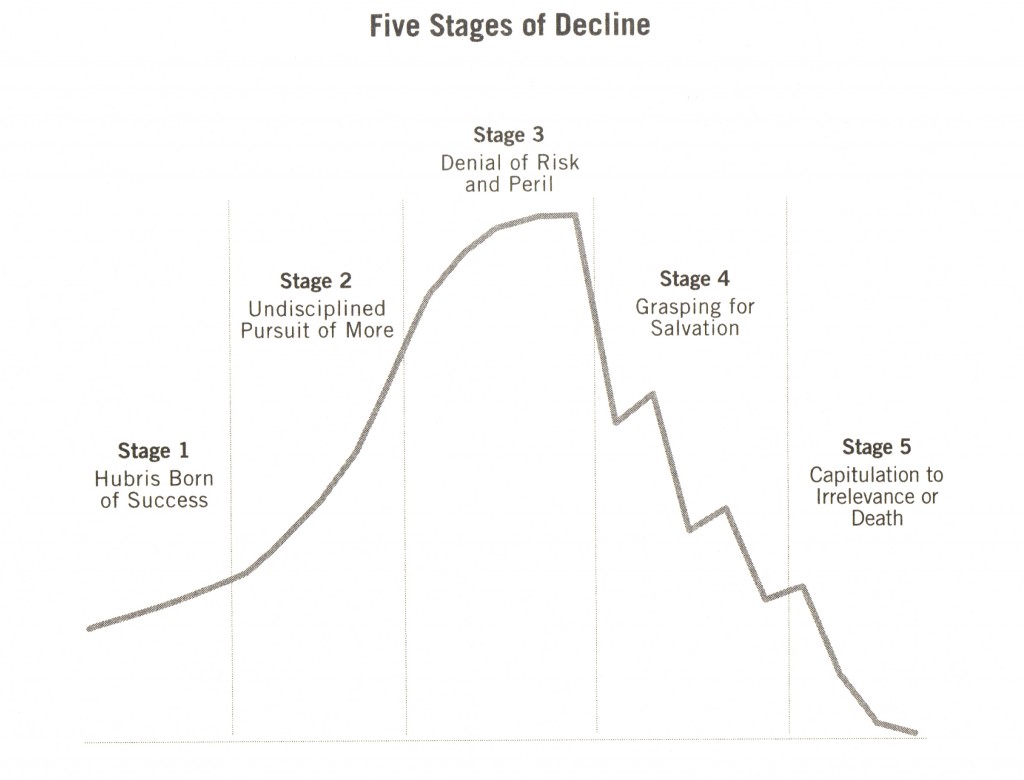Those of you familiar with his work know that he begins with data and attempts to support his hypotheses with evidence; his five-stage template for decline is no different. Also, he’s smart enough and intellectually honest enough to acknowledge that while “a staged framework of how the might fall did emerge from the data, it’s not the definitive framework of decline” (for example, it doesn’t address fraud, scandal, or “catastrophic bad luck”). Collins also invokes one of the most sagacious observations about frameworks like this, from the renowned statistician George E. P. Box (1919—2013): “All models are wrong; some models are useful.”
In this case, the model or the framework is useful only to the extent it can lend insight to leaders who wish to detect, prevent, or reverse decline.
This five-part series, then, won’t be about Law Land, any more than are Collins’ books about “Corporate Land.” They’re about very specific firms and where they go right and wrong. Because, while I’m sanguine about clients’ demand for what we are in the business of providing, I’ve gotten a close look at far too many firms for comfort that are taking themselves out of that race, by complacency, triumphalism, self-satisfaction, internal rivalries, short-term greed, blinkered thinking, flat denial, and…well, the list could go on.
Here’s the table of contents to this series, following Collins’, which comprise what he calls the “five stages of decline:”
- Hubris born of success
- Undisciplined pursuit of more
- Denial of risk and peril
- Grasping for salvation
- Capitulation to irrelevance or death.
Collins represents it visually:
On that jolly note, shall we begin?
I. Hubris born of success
The chapter-heading quote for this section could be Arnold Toynbee’s famous observation after studying the decline of dozens of famous human civilizations: “Nothing fails like success.” Or, as Collins puts it:
Great enterprises can become insulated by success; accumulated momentum can carry an enterprise forward, for a while, even if its leaders make poor decisions or lack discipline. Stage 1 kicks in when people become arrogant, regarding success virtually as an entitlement, and they lose sight of the true underlying factors that created success in the first place.
Here are some of the indicia Collins would have you be acutely tuned to watching out for:
- Entitlement: Success is viewed as deserved rather than fortunate, fleeting, or hard-won; people believe the firm will continue to succeed almost no matter what it does.
- Neglecting a primary driver: Leaders neglect a key component of the firm’s strength, instead attending to “extraneous threats and adventures.” They fail the demand that sources of success need to be ever renewed.
- “What” replaces “why:” Rhetoric replaces insight, or as Collins puts it, “We’re successful because we do these specific things” replaces “We’re successful because we understand why we do these specific things and under what circumstances they would no longer work.”
- Finally, the orientation towards continuous learning dissipates: Truly great individuals strive to maintain a learning curve as steep as when they first began; those who are less disciplined or more risk-averse quickly relax into a seductive comfort zone of preferring reassurance over challenge.
Don’t fall into the trap of assuming that firms that don’t change are doomed and those that do are saved: The critical question in examining any particular tactic or policy is whether the reasons it arose in the first place still apply and continue in a vital and current way to validate its usefulness—or whether circumstances have changed and the tactic or policy has become frankly irrelevant to current conditions.
Far be it from me to put words in your mouth, but some of those tactics and policies that might be due for a re-think with this attitudinal approach might include:
- the billable hour
- pure-ish lockstep compensation
- pure-ish eat what you kill compensation
- the partner/associate Manichean career divide
- the organizational structure of partnership itself
Stay tuned for Part II, the Undisciplined Pursuit of More.



